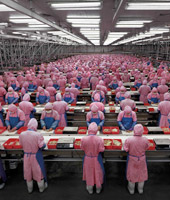 |
|
Autumn 2007 | Volume 30, Number 2
| Books, Film, & Music
|
|
|
Response onScreen
Manufactured Landscapes: The Cost of Consumerism

"Manufacturing #17," a 2005 photo of the Deda Chicken Processing Plant, Dehui City, Jilin Province, featured in Manufactured Landscapes. Courtesy of Zeitgeist Films. |
Very few people ever go to the video store in hopes of renting a movie about recycling and industrial waste.
But those who seek out documentarian Jennifer Baichwal’s film Manufactured Landscapes will see some unforgettable sights, and they may be provoked into challenging and rewarding discussion about how the choices we make can change the world for better, or worse, or even worse than that. If you want to stir up a lively conversation in your living room, invite your friends and neighbors to sit down and watch this challenging film.
Manufactured Landscapes is a grand tour of the work of an internationally renowned artist named Edward Burtynsky, who is famous for his vast photographs of factories, recycling programs, assembly lines, mines, dams, and scrap yards.
The film’s opening eight-minute scene may put viewers to sleep or prod them to get up and walk away. The camera glides along in a straight line from one end of a factory to another — past row after row of assembly-line factory workers who are constructing electronic appliances that you’ll find in most American kitchens. Those who let the camera carry them along for the duration will begin to understand Burtynsky’s intent: He wants us to consider the origins of luxuries we often take for granted, and the cost — both environmental and human — involved in constructing our convenient reality.
Baichwal follows Burtynsky through China, where he shows us appalling spectacles of waste. These images tell such detailed truth that they attain a strange, haunting beauty. We watch Chinese villagers salvaging precious metals by smashing apart circuit boards. Who knew that such jobs existed? Who could imagine these pageants of production and destruction that enable us to meander through our local Wal-Mart and pick up whatever we might need?
In his epistle to the Ephesians, the Apostle Paul writes, “Have nothing to do with the unfruitful deeds of darkness, but instead even expose them.” Artists can make a difference by inspiring us with visions of beauty, but they can also inspire us and change us by exposing those “tumors” brought on by indulgent lifestyles. Manufactured Landscapes reveals the damage we have done — and are doing — to the world with everyday choices at the grocery store, in the kitchen, at the gas station, and at the dumpster.
Baichwal’s film does not offer us solutions. But in a way, it is an important part of the solution — it tells the truth. It shows us part of the picture we’d rather ignore. It’s a dirty world — but somebody’s got to look at it. Otherwise, the ugliness and the disease will become so prevalent that it will spill over into our lives in ways we cannot ignore, with irreversible consequences. For many, the neighbors we have been called to love, those consequences are already a reality.
—By Jeffrey Overstreet (jeffreyo@spu.edu)
Read past columns in Response onScreen.
Back Page 3 of 3
Back to the top
Back to Books, Film, & Music Home
|
|
 |
|
 |